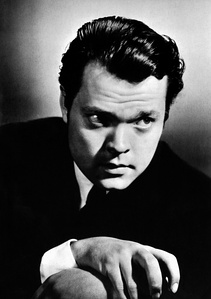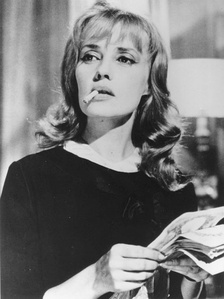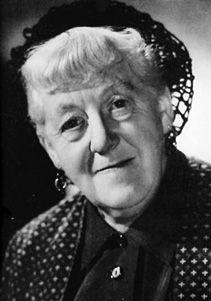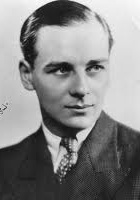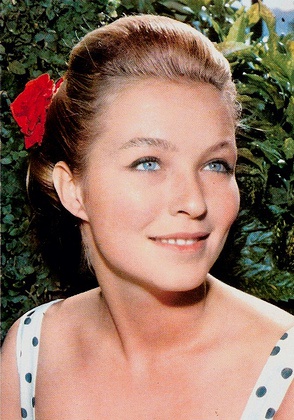午夜钟声 Campanadas a medianoche(1965)
简介:
- 本片被很多人认为是莎士比亚戏剧改编中成就最高的一部,由莎士比亚的五部戏剧浓缩而成。讲述英国国王亨利四世即位后,全国叛乱不止,形势动荡,王子却熟视无睹,与其密友胖武士弗斯塔夫终日豪饮作乐。弗斯塔夫是喜欢吹牛而无所不为之辈,他向亨利四世进谗言说王子平叛不力,把所有功劳归于自 己。后来亨利四世驾崩,王子继位为亨利五世,弗斯塔夫以为自己能加官封爵,岂料被昔日旧友一脚踢开。原来亨利五世力图振作,那段放荡日子从此不复返,弗斯塔夫只得郁郁而终。导演用自己的方式重新诠释了这个小丑故事,但对他持同情态度,因为导演指出弗斯塔夫的行径正是他对抗日益改变的世界的护身符,从他与王子之间的友谊变化,影射出这个世界早已今非昔比,往日的骑士精神也因为强权政治的诡诈绝情而荡然无存。
演员:
影评:
《午夜钟声》被认为是莎士比亚戏剧改编的巅峰。诚然如此,威尔斯将莎翁的数部戏剧融合在了一起,并将其作品中几乎所有主题都加入其中,最后进行天才般的再创作,于是诞生了这部伟大的杰作。威尔斯得把莎士比亚读得多么透彻才能写出如此原汁原味的对白,才能将不同的戏剧场景拼接得天衣无缝,才能创造出自己的午夜钟声。青出于蓝而胜于蓝,威尔斯将莎翁作品的戏剧性,悲剧性,哲学性都提高到了新的层次。
在表演方面,威尔斯成功地塑造了福斯塔夫这样一个乱世小丑的形象。他为了突显人物的形象,在外表上做到了极致,巨大的身躯如同肉山一样给人无限的压迫感,蓬乱的白发与饱经沧桑的脸颊相映生辉,玩世不恭的态度以及巧舌如簧的行为甚至还有些许可爱。这些元素集中于威尔斯精湛的演技上,通过他华丽的深焦摄影体现出来。肥胖的肉体代表着欲望的叠加与人性的堕落,对应着花天酒地无所事事的生活以及谎话连篇的圆滑处事。
威尔斯扮演的角色都是他自我的延伸。一些角色代表了不朽的人类形象,如马洛的浮士德博士,塞万提斯的堂吉诃德以及莎士比亚的约翰·福斯塔夫爵士。威尔斯从他崭露头角的青年时代开始,就如同一个置身凡尘的上古英雄,挑战人间的禁忌、法则,而其代价则往往是对上帝的藐视与冒犯(这也是他为什么也把恶魔归于他人性一面的原因)。他心目中最早的英雄是浮士德的后代,一批自大的、有着狂热幻想的魔鬼。就像威尔斯自己一样,他们横空出世,却又很快堕入命运的深渊。后来,一系列职业生涯上的受阻和失望,或是渴望得到怜悯和重整旗鼓的机会,使他变得小心翼翼,谦卑恭顺。在扮演福斯塔夫爵士的时候,他宣称这个角色浓缩了一种原初的、尚未得到赏识的美德。这种对一个老酒徒的过分神化,使得他轻易地忽略了福斯塔夫的贪婪和道德沦丧的一面。难道威尔斯自己也是一个悲剧性英雄,被自己的狂妄自大所击倒;抑或应该把他看作一个喜剧人物,因为一个小小的缺陷而变得萎靡不振?
摄影方面还是威尔斯标志性的深焦摄影,光影舞动间平面的影像仿佛获得了立体感,跳动的摄影机好似有了生命通过屏幕与观众对话。为了体现莎翁剧的戏剧性威尔斯放弃了他的杀手锏长镜头,而采用多机位跳切以加深影像的冲突感。在人物对话时至少有几十个机位来回切换,普通的正反打在多视角的切换中具有了无限的可能性,人物关系与机位变化相得益彰,共同为情节服务。总之,威尔斯的机位只有你想不到的,没有他拍不到的。其中最为精彩的战争戏借用画面构图的角度与低机位特写快速剪辑将几十个人的战斗拍出了千军万马的气势,而如今的好莱坞大片用上亿的特效也不过如此。
权利的诱惑是电影的主线,威尔斯用了大段的篇幅来做铺垫,为了在结尾达到高潮。亨利四世用尽手段夺得了王位,但是儿子却不学无术整天和福斯塔夫混在一起,胸无大志,而福斯塔夫想要巴结王子以图日后发达。他们总是开着玩笑讽刺对方,但也只是玩笑,从来不会放在心上。面对父亲的失望,儿子也想为自己争光,于是带兵镇压了叛乱。在权利与荣誉的染指下,他渐渐被这些诱惑迷住了双眼,再也找不回曾经与福斯塔夫那些"下等人"一起玩笑的自己。权利的诱惑能够蛊惑人心,亨利四世病危在床仍然不忘让人把皇冠放在枕边,儿子看见这金光闪闪的皇冠不假思索地便戴在了自己的头上,"名正言顺"地继承了王位,亨利五世诞生了。落魄的福斯塔夫听闻这个消息激动不已,认为作为昔日的好友一定会连带沾光,谁知当他满怀期待地找到亨利五世的时候,却被他无情地放逐。他跪倒在地一言不发,脸上从愤怒到不解最后漏出欣慰的笑容,这是对好友终于登基的骄傲与祝福,也是对世道人心变迁的感慨与无奈。
在权利的诱惑以及内心无限欲望的驱使下,曾经的那份初心早已不在,这是骑士精神的消亡,更是时代终结的悲歌。福斯塔夫还妄想着亨利五世是因为在众人面前做样子才这么做的,晚上一定会再请他单独见面,直到午夜的钟声敲响,他终于明白已是曲终人散。在大远景中福斯塔夫走进了最下角的小门,淡出了这个不属于他的时代。
"你们不曾见过我们所见的",是啊,曾经的一切已经随风飘散,午夜的钟声已经敲响,纪念这永远回不来的曾经。
最近看到午夜钟声的字幕被人上传到字幕站了,就稍微说说吧:
我是本片的(部分)译者,当初翻译这部片子时群里在搞电影节(大概是2020年春天),出于对奥逊威尔斯先生的敬爱就接下来了翻译这部鸿篇巨制的任务。
其实接之前就预想过会很难翻译,但是没想到会那么难翻译。奥胖对于莎翁的通读基本到了一个境界,他的改编没有用白话文演绎,也没有整段整段的照搬原文,而是简练得将莎翁的五本戏剧编排在了一起,保留了那些华丽的词藻和,剔除了冗长的戏剧式自述来使它更加电影。一个角色的两句台词是他实际段落的开头和结尾,两个连续的桥段来自两本戏剧,这样的情况在这部电影中比比皆是。最夸张的是,不知道有没有记错,有一场戏A的对白出自一本戏剧,B的回答就出自另一本。
我翻译的时候主要的参考文献是nofear(一个帮助读莎士比亚的英文网站)和朱生豪先生的中文译本。因为有着上述的情况,翻译起来真的很困难,基本要一句话一句话放到谷歌里去搜才能搞明白那些古英文到底是什么意思,找中文译本就更加麻烦了。而且就我翻译的段落里,很多地方两份文献也存在着巨大的误差,权衡下来我的选择基本是相信nofear的解释来修改朱老的译本。
因为实在翻译不下去,所以战争后的部分我交给了@帽子里的兔子 老师去翻译。这里还有一个交流问题,我翻译的部分是中英对照的,而他翻译的部分删除了英文只留下了中文,不过当时也只是为了内部交流所用,就没太在意这一点。大概在全部翻译完之后我全片看了一遍,稍微修改了一下以确保逻辑通顺后就发在群里内部传阅。原本打算拜托一位老师精校后再发布出来,但后来也没了下文,结果最近不知怎么的就被上传了也是很迷惑。
既然这个字幕已经被上传了那大家想看就看吧,内容上有什么问题可以跟我指出,真要骂的话也来骂我吧不要去骂兔师,毕竟是我找他帮忙的。我也会尽量在有生之年(找人)搞出一版精校版字幕来方便大家观看,如果有哪位大神愿意做这个就再好不过了。
- 今天聊聊奥逊·威尔斯的《午夜钟声》(Chimes at Midnight)。
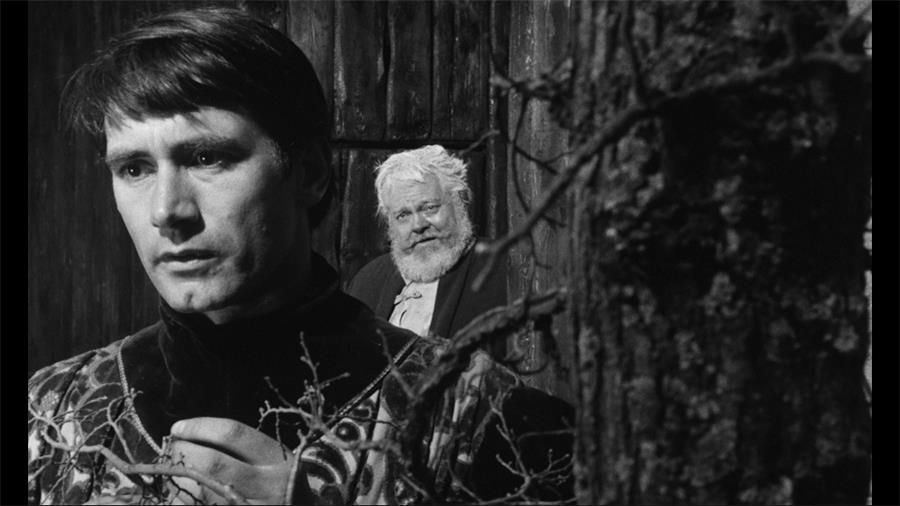
电影由莎士比亚戏剧改编,上映时在美国国内遭遇了几乎一边倒的差评,长时间内都被视为一部失败的电影。还好,真正的经典总能经历住时光的不断冲刷,还闪耀出最初的光芒,时至今日,再没人去质疑《午夜钟声》的艺术价值和影史地位了。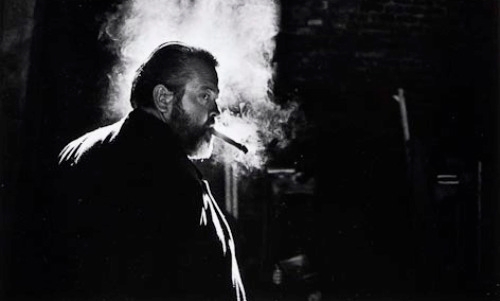
奥逊·威尔斯(Orson Welles)这几个字几乎就是天才的代名词。他出身优越,父亲是发明家,母亲是钢琴家,儿时的他就周游过世界,掌握多国语言。20岁之前,舞台剧、电台播音、画家、作家,样样他都得心应手。23岁时,制作了广播剧《世界大战》,仅靠自己的声音就造成了全国性的大规模恐慌,不过这也帮助他在一夜之间家喻户晓。26岁时,拍摄了影史最伟大的电影《公民凯恩》,到现在很多电影榜单还被这部影片霸占榜首。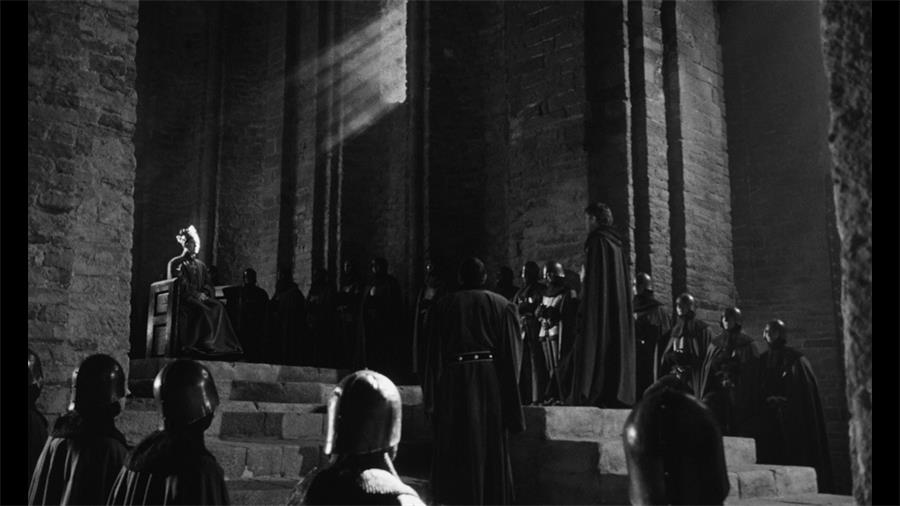
如果人品守恒定律真的存在的话,威尔斯也许就不会希望自己的年轻时代如此辉煌。因为,在《公民凯恩》之后,他似乎已经用光了一生的运气。
电影公司和制片人对他缺乏基本的信任,每次他的电影项目都只有少得可怜的预算和极短的拍摄周期。影评人也对他极不待见,要知道在那个信息渠道被媒体掌控的年代,电影评论很大程度上能够决定一部电影的生死。从那之后,威尔斯也开始了自我放逐,把大部分的时间都花在欧洲等地。
让我们来看看《午夜钟声》拍摄时,威尔斯遇到的那些难题。
首先是预算,刚开始投资人以这部莎翁改编剧没有市场吸引力而拒绝投资,直到威尔斯承诺拍摄商业片《金银岛》,他才拿到了第一笔资金(不过,威尔斯到最后也没有执导金银岛,却在若干年后出演了同名电影)。在演员方面,几位主演的档期都非常紧张,如饰演亨利四世的约翰·吉尔古德(John Gielgud)只有十天的空挡,威尔斯只好有限拍摄其他主演的戏份,而将自己的重要戏份放到到了整个拍摄周期的最后,通过后期剪辑来完成同框的效果。声音方面,因为现场效果太差,音效几乎全由后期制作,成品中的音画不和谐,也成了各路评论攻击的焦点。
在坎坷的拍摄经历中,只有威尔斯那唯一不变的身影,不知疲倦的穿梭在各种困境之间。这种坚持绝不是源于商业利益的驱使,优渥的家庭条件和高级的家庭教养,使得金钱从来不是他的首要考量。他一心追求伟大,期望作品传世,在他身上流淌着对电影艺术最纯粹的热爱,拍电影对他而言,更像是一种使命的召唤。所以,困境根本阻挡不了他的脚步,几乎所有的作品都深深烙印着他本人近乎贵族的气质和高级的品味。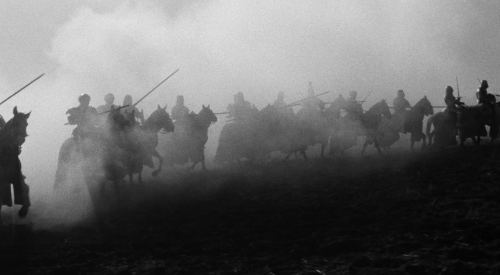
影片最终呈现出的效果非常惊人。最精彩的,要数中旬那场气势恢宏的战争戏了。威尔斯借鉴了绘画中的透视技巧,将仅100多个人的现场拍出了千军万马的感觉,很难想象整部电影的预算还不足100万美元。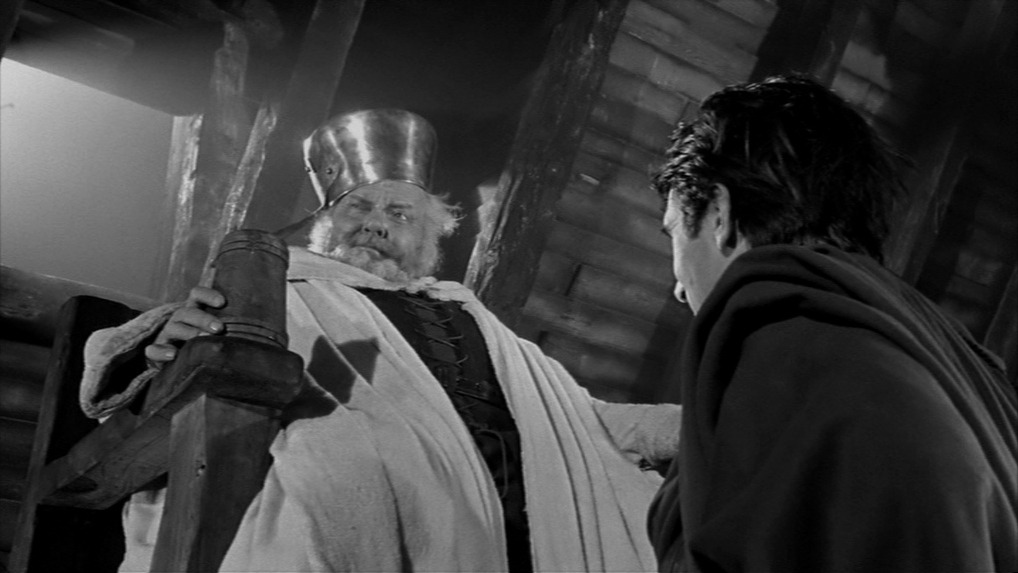
“背叛”是本片的主题,这种被最亲爱之人伤害的故事总是能勾起我们的同情。 福斯塔夫是莎翁戏剧《亨利四世》中的经典角色,其人妙舌如簧,机灵过人,又胆小如鼠、自私懒惰,威尔斯除了完美的诠释了这些特质外,还演出了这个小丑式人物骨子里对情义的珍视。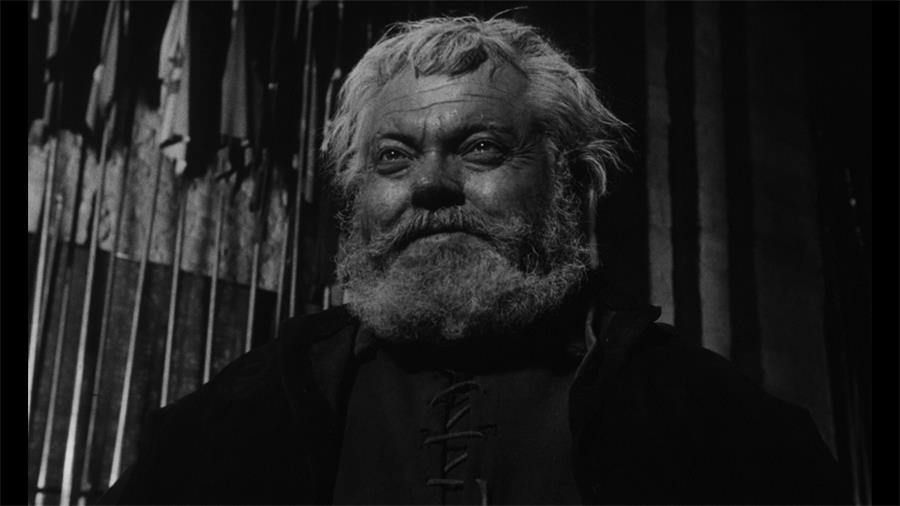
影片最后,王子登基时决绝地抛弃了前来示好的旧友。威尔斯饰演的福斯塔夫,经历了惊讶、伤心、绝望后,含着眼泪流露出一丝微笑,那是一种看到挚友称王之后的骄傲和祝福,更是知道自己将永远退出对方生活的惆怅和无奈。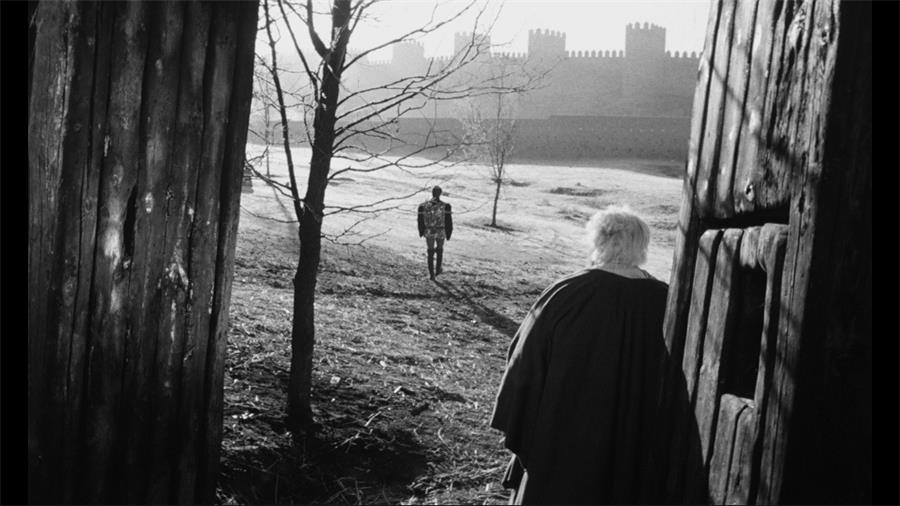
威尔斯曾表示,如果他能凭借一部作品进入天堂,那必定是这部《午夜钟声》。天才们总是运用超越时代的思维和技巧进行创作,他们宁愿承受这不被当世理解的孤独和压力,也不愿意妥协而违背内心的声音,这才造就了那些耀眼的经典作品。
有时想想,不光是观影,很多事情在下结论前,不妨让子弹飞一会,毕竟,时间才是最好的评委。
(欢迎关注个人微信公众号:迷途小虾。感兴趣的请搜索“迷途小虾”或扫描二维码)
June 4, 2006 |Roger Ebert
There live not three good men unhanged in England. And one of them is fat and grows old.
How can it be that there is an masterpiece that remains all but unseen? I refer not to incomplete or abandoned projects that have gathered legends, but to "Chimes at Midnight" (1965), his film about Falstaff, which has survived in acceptable prints and is ripe for restoration. I saw the film in early 1968, put it on my list of that year's best films, saw it again on 16mm in a Welles class I taught, and then could not see it for 35 years.
It dropped so completely out of sight that there is no video version in America, Britain or France. Preparing to attend the epic production of both parts of Shakespeare's "Henry IV" at the Chicago Shakespeare Theater, I wanted to see it again and found it available on DVD from Spain and Brazil. Both versions carry the original English-language soundtrack; the Brazilian disc is clear enough and a thing of beauty. What luck that Welles shot in black-and-white, so there was no color to fade.
This is a magnificent film, clearly among Welles' greatest work, joining "," "The Magnificent Ambersons," "" and (I would argue) "The Trial." It is also magnificent Shakespeare, focusing on Falstaff through the two "Henry IV" plays to his offstage death in "." Although the plays are much abridged, it is said there is not a word in the film not written by Shakespeare.
Falstaff, "this huge hill of flesh," is one of Shakespeare's greatest characters -- the equal, argues Harold Bloom, of Hamlet. He so dominates the Henry IV plays that although Shakespeare promised he would return in Henry V, he reconsidered; the fat knight would have sounded the wrong note in that heroic tale, and so we learn from Mistress Quickly of his death, as he "babbl'd of green fields."
Welles was born to play Falstaff, not only because of the physical similarity but because of the rich voice, sonorous and amused, and the shared life experience. Both men lived long and too well, were at odds with the powers at court and were constantly in debt. Both knew disappointment, and one of the most sublime moments in Welles' career is simply the expression on his face at the coronation of Henry V, when he cries out "God save thee, my sweet boy," and the new king replies, "I know thee not, old man."
Prince Hal, later Henry V, is played in the film by , who looks dissolute enough in the roistering at the Boars Head Tavern, but as early as Act 1, Scene 2 is an unpleasant hypocrite in the monologue where he admits his present misdeeds but promises to reform at the right time. In Shakespeare, this is a soliloquy; in Welles, Falstaff listens in the back of the shot and is forewarned. Later, in an echo of that composition, the prince looks impatiently toward the field of battle as Falstaff, behind him, questions the concept of honor. That each man hears the other's intended soliloquy adds a dimension to both.
Welles as director uses some of his familiar visual strategies; the vast interiors of Henry IV's castles contrast with the low ceilings and cluttered rooms of bawdy houses, just as the vast space of Kane's great hall contrasts with the low ceilings and dancing girls of the New York Inquirer. Royalty in "Chimes at Midnight" is framed by vast cathedral vaults, with high windows casting diagonals of light. Welles uses dramatic camera angles, craning to look up at the trumpeters atop the battlements as Henry IV rides off to battle.
At Mistress Quickly's, on the other hand, Falstaff and his roisterers have great freedom of movement involving doorways and posts, barrels and vertiginous staircases, barking dogs and laughing wenches. He and other actors circle verticals and one another as they speak, just as Welles and circled in "Citizen Kane" and "." And watch the use of deep focus when he begins a shot with Hal seated in the background and, as news of his father's death is conveyed, Hal stands and moves forward, finally looming over the camera in foreground. All one shot.
The scene of the battle of Shrewsbury is justly famous. It lasts fully 10 minutes, chaotic action at a brutal pitch, horses and men confused in smoke and fog, steel crashing against steel, cries of pain, desperate struggles, confused limbs caked in mud and blood, men falling exhausted or dead. Barbara Leaming, one of Welles' biographers, says the scene was created by careful framing; Welles at no time had more than about 100 extras, yet seems to have a multitude, and the violence of the struggle was studied by before he directed "."
The battle is intercut with shots of a fat man in armor, hurrying and scurrying out of the way and finally playing dead. When Hal finds Falstaff flat on his back, he cries out, "What, old acquaintance! Could not all this flesh keep in a little life?" We know Falstaff is not dead, and Welles finds a way to let Hal know, too: the frost on the old man's breath puffs out from beneath his visor. Yes, it was cold. Welles shot on location in Spain, in winter; his first shot shows Falstaff as a tiny figure in a vast field of snow, his last shows Falstaff's coffin being pushed across snow toward his grave, and in several of John Gielgud's speeches as Henry IV, we can see the frost on his breath.
That Gielgud played the king and others such as (Mistress Quickly) (Doll Tearsheet) and (Worcester) also appeared in the film is a tribute to Welles' reputation, for on a budget of less than $1 million he was, like Falstaff, not prompt to pay. Gielgud plays Henry IV as a dying man almost from his earliest scenes, plagued with guilt because of how he won his throne. His son is no consolation; the king envies Northumberland his son Henry Percy, known as Hotspur (), and wishes "would I have his Harry, and he mine." He excoriates the thief and whoremonger Hal and his low companions, none lower in deportment or loftier in essential humanity than Falstaff.
How good is Falstaff? Consider the way warm affection illuminates the face of Jeanne Moreau as Doll Tearsheet caresses and tickles her beloved old rogue. Note the boundless affection Falstaff has for all around him, so real that even Quickly forgives his debts and allows him to contract new ones.
Such scenes illuminate the life Welles poured into "Chimes at Midnight." He came early to Shakespeare; he edited and published editions of some of the plays while still at prep school. On stage and screen, he was also Othello and Macbeth, his voice fell naturally into iambic rumbles, he was large enough for heroes and so small he could disappear before Henry V's scorn. He once asked an audience, reduced by a snowstorm: "Why are there so many of me and so few of you?"
There was not something Falstaffian about Welles, there was everything. As a young man he conquered all that came before him (at Shrewsbury a knight meekly surrenders to the old man, awed by his leftover reputation). Welles grew fat and in debt, took jobs unworthy of him, was trailed by sycophants and leeches, yet was loved by good women and honored by those who could see him clearly. And he battled on, Quixotic as well as Falstaffian, commencing grand schemes and sometimes actually finishing them (indeed, his "Don Quixote" can now be seen in intriguing but incomplete form).
The crucial point about "Chimes at Midnight" is that although it was rejected by audiences and many critics on its release, although some of the dialogue is out of sync and needs to be adjusted, although many of the actors become doubles whenever they turn their backs, although he dubbed many of the voices himself, although the film was assembled painstakingly from scenes shot when he found the cash -- although all of these things are true, it is a finished film, it realizes his vision, it is the Falstaff he was born to direct and play, and it is a masterpiece. Now to restore it and give it back to the world.
Note: A restoration of "Chimes at Midnight" is said to be in progress, with a possible release in a year or two. A Brazilian import that will play on North American machines can be ordered at:
Also in the Great Movies collection at rogerebert.com are Welles' "Citizen Kane" (1941) and "Touch of Evil" (1956) and Carol Reed's "The Third Man" (1949).

